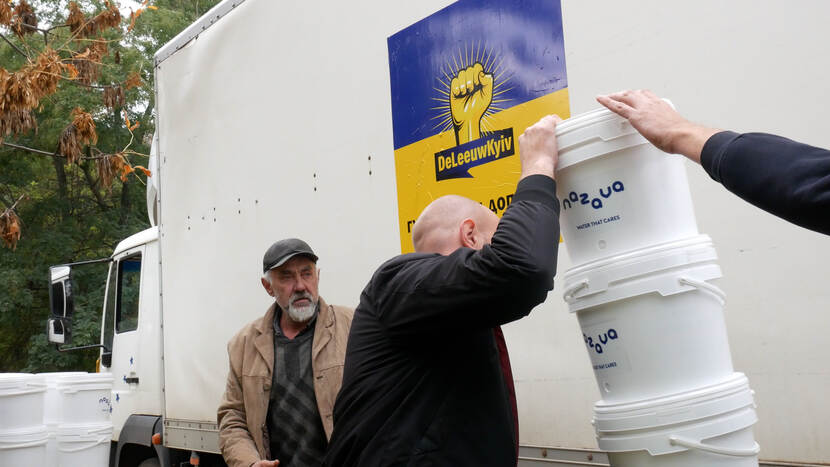Generators and water filters for Ukraine: ‘We help where the need is greatest’
The war has left many people in Ukraine without access to electricity or running water. The need is especially great in areas that have recently been liberated. The Dutch embassy in Kyiv supports organisations that can rapidly make a difference to local communities, like Stichting de Leeuw Kyiv (The Lion Foundation Kyiv). Guido van Engelen and Emmeke Vierhout talked to us about their work.
After a week in Kyiv, Guido joins the long queue of cars at the Polish border. He’s just brought another consignment of generators from the Netherlands to Ukraine. ‘They only let ten cars through an hour. So we’ll be here for a while,’ he sighs. An air raid siren wails in the background, but Guido isn’t too worried about missile strikes. ‘Statistically, there’s very little chance of a strike happening right here. In the south and east of the country it’s a very different story. They’re hit by missiles every day.’
Guido has lived in Kyiv for 30 years and works in real estate. When Ukraine was invaded he drove straight to the Netherlands. ‘I’d made a pact with my family: if war breaks out, I leave.’ Emmeke left with her children that same day. She and her husband Kees have been living on a farm in central Ukraine for the past 15 years.
Stichting de Leeuw Kyiv
En route to the Netherlands, Guido and Emmeke reached out to other Dutch entrepreneurs who’d had to flee Ukraine. ‘We immediately got together to set up a fundraiser,’ Emmeke tells us. ‘We’ve all got extensive business networks and know the country well. As a result, the first consignment of food, clothing and other aid supplies arrived in Ukraine within a week.’
Since then, the entrepreneurs have joined hands in efforts to help Ukraine. ‘We’d already set up a foundation: Stichting de Leeuw Kyiv,’ Guido, the chair of the foundation, explains. The original aim had been to promote Dutch language and culture in Ukraine, but he suggested adopting humanitarian goals instead. ‘That was the quickest solution,’ Emmeke says. ‘It often takes weeks to set up a new foundation. Keeping the existing structure meant we could immediately take action and receive donations.’
Hundreds of generators
Russian attacks have destroyed much of Ukraine’s electricity supply. ‘In Kyiv the disruptions often only last a few hours, but in many other places there’s no electricity at all,’ says Guido. ‘There are villages where people have had no power for weeks. It’s unimaginable.’
In recent months the foundation has already delivered hundreds of generators to Ukraine. The entrepreneurs collect them in the Netherlands and then transport them by lorry to Ukraine. ‘The big generators are sent to hospitals, army bases and other critical infrastructure. The smaller ones are distributed to households,’ Guido explains. The priority is to send generators to areas where there is no power at all. ‘We help where the need is greatest. Even a small generator helps: people can use it to charge phones and torches.’
Safe drinking water
The power cuts also affect the water supply. ‘No electricity often translates into no running water,’ Guido says. He is worried, because pipes can easily freeze when temperatures plummet in winter, causing irreparable damage. Combined with the devastation of water purification plants, this creates a shortage of safe drinking water. ‘As a result, lots of people are dependent on surface water, like rivers and lakes,’ Emmeke explains. ‘But the water is often heavily polluted because of the war – there’s debris in it, and dead bodies. Which makes the risk of disease even greater.’
Ten thousand water filters
Emmeke contacted two fellow alumni from Wageningen University. ‘They designed cheap and relatively simple water filters, consisting of two buckets and a ceramic filter element that removes bacteria.’ The filters can be used to purify rainwater, water from lakes and rivers, and even snow.
With the help of local volunteers, the foundation has already distributed 10,000 water filters in Ukraine. The filters are produced locally. ‘We’re responsible for fundraising and coordination,’ Emmeke explains. ‘The buckets are produced in Ukraine, and a local foundation called Save UE oversees filter assembly and distribution – work that’s largely done by internally displaced people.’
Preparing for spring
It might still be midwinter, but Emmeke and Guido are already preparing for spring. ‘A lot of people are fleeing regions where there are still daily attacks, like Kherson. At the moment, there’s less demand for water filters, but when people go back in spring to work their land, a lot more filters will be needed. So we must prepare for that now.’
In the coming months the foundation hopes to distribute another 10,000 water filters in Ukraine and supply as many communities as possible with generators.
Dutch aid to UkraineThe Dutch embassy in Kyiv is supporting small, agile aid organisations, which are often able to respond swiftly, giving Ukrainians vital emergency assistance. Small NGOs and volunteer organisations are playing a key role in Ukraine: they often have an extensive local network and good knowledge of where aid is needed. In 2022 the embassy had a €250,000 fund with which to support these kinds of organisations, and the same amount has been allocated for 2023. Using this fund, the embassy financed four projects last year, including the activities of Stichting de Leeuw Kyiv. The fund is an important addition to the existing resources of the embassy and the international organisations that the Netherlands supports, such as the United Nations and the World Bank. Read more about Dutch aid for Ukraine:
|
Originally published at https://www.government.nl/latest/news/2023/01/24/generators-and-water-filters-for-ukraine-we-help-where-the-need-is-greatest




